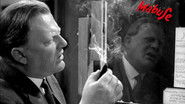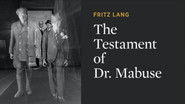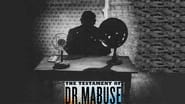Actuakers
One of my all time favorites.
Dorathen
Better Late Then Never
Sexyloutak
Absolutely the worst movie.
BelSports
This is a coming of age storyline that you've seen in one form or another for decades. It takes a truly unique voice to make yet another one worth watching.
Leofwine_draca
This film from Fritz Lang, who also gave us M and METROPOLIS, has some good bits but mostly it's just dialogue - subtitled dialogue, too. The film's main fault lies in the running time - it's on for far too long, and a bit of judicious cutting would have made things a lot more bearable. For the most part it's a typical thriller with a lone policeman hunting down a gang of criminals - there are lots of mystery elements and minor subplots about tragic lovers and one memorable insane guy, who sings whenever anybody gets too close.The acting ranges from the good to poor - the good being the gruff police inspector, who is an outsider among his peers. He's fairly clichéd, yes, but I liked him. Unfortunately to counter this interesting character there's some awful love filler with a ludicrous mugging woman who really annoyed me - but then we can't have everything.Where the film does work is in the minor horror elements which crop up. One such scene has a character being haunted by the spirit of Mabuse, who appears with huge spooky-looking eyeballs. The special effects are also pretty good, with some nice explosions and people being superimposed over the action. Adventure fans will enjoy a tense shootout and one of those classic moments which has a couple trapped in a flooding locked room, but these fun moments are few and far between. It's an intelligent and remarkable film, yes, but just not one which is particularly enjoyable.
Horst in Translation (filmreviews@web.de)
"Das Testament des Dr. Mabuse" is a German black-and-white film from 1933, the year Nazis rose to Power in Germany. It is the first of many sequels to the original Dr. Mabuse movie from 10 years earlier. Now that was an insufferably long movie that was truly painful to sit through. This one here is not that bad, mostly thanks to the inclusion of sound. Mabuse is considered safe in an insane asylum and later dead, but there are indicators that he is committing crimes all over the town. And that is why a local police detective picks up the case and tries to find out if Mabuse is alive or dead.I think it's nice that this film was banned by the Nazi regime as it shows that it includes some (for that time) inconvenient truths, but sadly, this alone is not enough to make it a good watch for which many apparently mistook it looking the film's high rating. There are a couple fairly interesting scenes like the beginning or the scene in which we see the doorknob/gramophone application, but as a whole it is simply not enough for a film that almost makes it to the 2-hour mark. I must say I liked some of Lang's other works more, such as the famous "Metropolis" of course. "The Testament of Dr. Mabuse" is not among his finest achievements. Thumbs down.
funkyfry
This film was famously banned by the nazi party, and Lang beat a quick retreat from Berlin after hearing the news. To some extent we can see why -- the film depicts a criminal gang, run by a ruthless maniac who wants to use industrial terrorism to strike fear into the population and ultimately gain control. Sounds familiar? I guess Goebbels thought so too.It's an interesting film, poised as it is partway between his silent career and his future talking film career in America. The film features a recurring character (Commissioner Lohmann) from his previous masterwork "M", and also the same kind of fascination with technology that was present in the first "Mabuse" film and in "Spies" and "Metropolis." This would show up less frequently in his American films, but "Cloak and Dagger" certainly is brethren to this film. It also features some really startling car chases that are a more elaborate version of what he had done in "Metropolis." Some of his expressionist devices are quite startling, especially Mabuse as a ghost with his huge pale eyes, and the way Dr. Kramm's (Theodor Loos) head is framed against the rushing trees almost looks as if we're seeing inside the fabric of his brain. The film also shows up Lang's weaknesses, specifically his inability to make the "heroic" characters in the film convincing or two- dimensional. Gustav Diessl is barely adequate as Tom Kent, whose name is as dull and straightforward as his character, and Wera Liessem's Lilli, the love interest, is a study in poor acting and stale characterization. But the film's a winner, because even all these many years later you are sure to see something that you've never seen before in a film. Lang's visual sensibility and his excellent editing move the film forward like a mack truck. Klein-Rogge is as chilling and otherworldly as ever, and his criminal madman in an asylum was surely an inspiration for many future film villains right up to the present day (some of his lines of dialog were clearly lifted for Nolan's "Dark Knight"). I think the film is slightly unbalanced by the policeman (Otto Wernicke) being given more screen time than either Mabuse or the ostensible hero of the film, but why quibble? It's stood the test of time and will surely be thrilling people when a lot of the big blockbusters of our day have been forgotten.
MisterWhiplash
The Testament of Dr. Mabuse is something that one might not expect in the catalog of work by the towering figure in German cinema, Fritz Lang. The film is, actually, a sequel. Or, correctly, the second part of what is in retrospect a trilogy (it ended with 1,000 Eyes of Dr. Mabuse, which ended up being the director's final film). It concerns the title character, who in the first film - arguably the first 'crime epic' as at four and a half hours - chronicles in expert detail how a madman takes over a German city with his hypnotic powers of criminal influence.That film as well as this sound-era follow-up, the latter of which got banned by Goebbles for supposed influence on the public (and no wonder with its 'Mystery Voice' of influence, but more on that in a minute), are not exactly "high art." On the contrary, I think Lang would readily admit these are popular works of art, inspired initially by a pulp serial. Indeed watching this film in particular I can't help but think with its swath of criminals under a madman's "testament" and spell (particularly after his demise) and police force inching closer and closer to discovering the secrets of this man's plan, that all it's really missing is Batman. Matter of fact, it wouldn't surprise me a bit to discover that, one way or another, Bob Kane or Bill Finger didn't watch this (or the original bad-ass 1922 epic feature) to inspire Gotham just a bit.In this world, people are desperate. It's hard not to see it as Lang shows a flashback of one of the employment-desperate criminals, who has one little spot of hope with a woman who loves him practically unconditionally (or maybe she's one of those 'I can change this Bad Boy' types, but I digress). These were tough times, and people might just decide to turn to crime as those jobs weren't available - or, as Goebbles might have picked up on, the desperation of the German people to Follow The Leader so to speak. For most of the film we don't know who is this Man Behind the Curtain (literally!) who delivers orders and demands to the criminals that they must carry out; mostly, it seems, involving a jewel heist worth hundreds of thousands.It's curious that Lang casts/repeats the same character and actor from *M*, not the original Dr. Mabuse silent film, Captain Lohmann, for this film. Perhaps it's a crossbreed then of sequels, which is rare for any director to attempt: the same man who caught that child killer played so notoriously/well by Peter Lorre would return to find out this "Testament" era of Dr. Mabuse. We only see a little of Mabuse anyway... in *living form* that is. He scribbles notes and delivers them from his room, somehow. Of course I wouldn't dare reveal too much - yes, even for a film that is over eighty years old - but how it is actually getting out to the criminal elements are devilishly clever, if maybe, just a little, obvious.But Lang is dealing in clichés here and having so much fun doing it. And his filmmaking is one of two modes and always so pleasurable to watch: either he's patient, waiting with his shots as the silent film master that he was, taking in actors' movements, usually when they talk right at the camera/the audience, OR he exercises his action-film chops with plenty of energy, particularly in the first act when we see a man who becomes surrounded by some of Mabuse's "minions" (which may involve a barrel full of explosives), and then in the climax which involves a chase and a man driving a car in a complete daze. Lang takes his time with his pulp, and milks moments for all they are worth. Of course watching bits like the one criminal and his girlfriend Lillie is a little dated (just how, you know, unconditional she is in her love), but you can take that with a grain of salt hopefully.What's so striking here is how Lang gets this cops vs criminals thing down so well; he did it before in the first segment, and one wonders going in if there will be enough time to develop all of this. But this time it works so ingeniously because it's the crazy aftermath of Dr. Mabuse's reign (spoiler: he dies halfway through the film). So that his influence is practically supernatural, as he appears to characters as a crazy apparition, with eyes bugging out and a a face in crazier contours. It's this kind of scene that just by itself will make your hair rise. In the rest of the story... it makes sense, sort of. The acting matches the intensity of the action, and makes for a helluva potboiler. This is a filmmaker making a point about the terror and horrors of crime - and, of course, what a simple voice can do for easily impressionable people in dire straits - while having a lot of fun, in his own diabolical way. It dwells in the darkness of the human soul...Again, like Batman.









